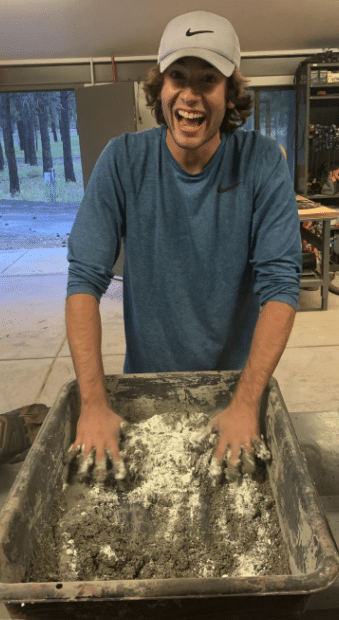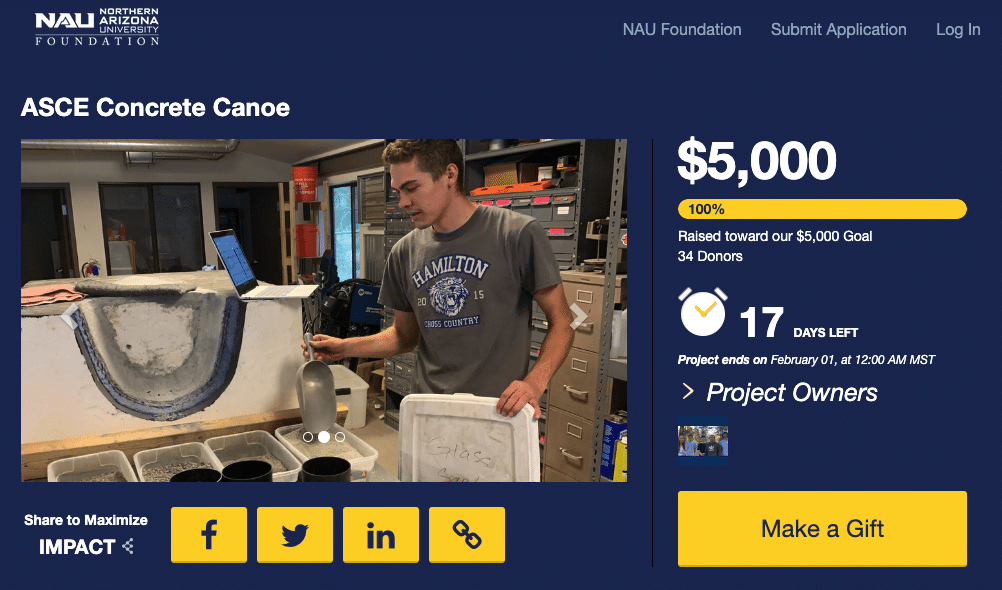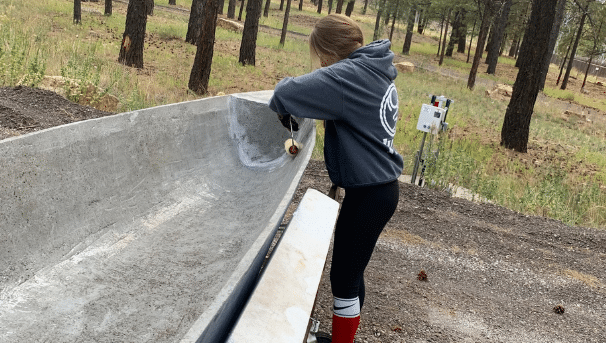Dense, heavy, solid—all words used to describe concrete. One way it is not typically described? Buoyant.
A group of civil engineering students at Northern Arizona University is determined to prove that with the right design and mixture, concrete is not only light, but can float.

“Concrete essentially has two components: cement, which acts as the glue, and aggregates, which usually consists of sand and gravel,” senior Russell Collins said. “In order to make the concrete float, there’s not much we can do about the cement as that is what makes concrete, concrete. But we can change out the heavier aggregates and put in aggregates that are lighter—instead of rock, we might crush up some Styrofoam and use that. If we put enough Styrofoam in the concrete, it should be able to float.”
The concrete canoe project is part of the American Society of Civil Engineers (ASCE) Pacific Southwest Conference, an annual chapter gathering of students from 18 universities in California, Nevada, Arizona and Hawaii who compete in a wide range of civil engineering challenges.
“I first heard about the competition when I attended an ASCE meeting during my freshman year,” said senior Marie Cook. “The project interested me because everyone who was involved in the competition seemed to be really into it and passionate about producing the best possible canoe.”
Since that initial meeting, Cook has been competing in the competition every year, working as a volunteer mentee to assist the captains. This is the first year she’ll officially be on a team as a captain herself, working as the project manager. She is one of five civil engineering students who make up the 2021 concrete canoe team, along with Collins, the mix design captain; Scott Murphy, the structural design captain; Kyle Julle, the hull design captain; and Ryan Wassenberg, who is in charge of quality assurance and quality control.
Assembling the team was easy—like Cook, each of the other members had also assisted with canoe designs in year’s past and had a passion for creative problem solving. The not-so-easy part? Coming up with $5,000 to fund their project.
Because of COVID-19, the students were not able to host their usual ASCE fundraisers. So, they had to think of other ways to come up with the money. They turned to a method that has grown especially popular during the days of the pandemic: online fundraising.
Setting up the Crowdfunding page turned into a project all on its own.
“We as a team needed to decide on a fundraising goal, a communication plan, our key audience, possible donation giving levels as well as writing the descriptions that are seen on the page,” Wassenberg said. “Once our page was complete, we had to follow through with our communication plan, which included sharing posts on social media and asking for donations from engineering companies.”

“We are thrilled!” Wassenberg said. “The concrete canoe building event is one of the larger competitions in the Pacific Southwest Conference. We hope to not only gain the attention of engineering firms, but also win.”
Normally, the three-day conference is held at a host school where students from throughout the West construct their concrete canoes and compete in two- and four-person races. Due to COVID-19, the 2021 conference will be held virtually, meaning the physical construction of a canoe is not required. This year, the scoring is based on the team’s technical proposal, technical presentation and an enhanced focus areas report.
The students have decided that the money left over from the fundraiser will be donated to the NAU canoe program in hopes of helping future teams compete in the conference.
“This competition will be a great learning opportunity, especially for five graduating civil engineering students that will be entering the workforce amidst a global pandemic,” Cook said. “Although we are all bummed that we cannot compete in person and meet fellow engineering students from throughout the country, this will nonetheless be a great learning and growing opportunity for our team.”

(928) 523-5582 | carly.banks@nau.edu




